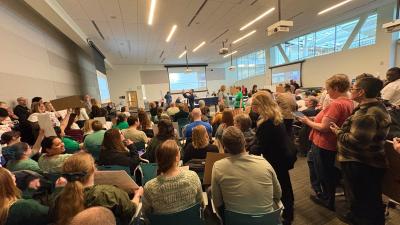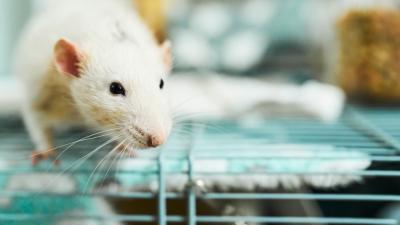In Landmark Shift, NIH Announces It Will No Longer Solicit Animal-Only Research

Washington, D.C. – In a historic move, the U.S. National Institutes of Health (NIH) announced today that it will no longer seek research proposals exclusively for projects involving animals. In addition, all new agency funding opportunities will include language on nonanimal methods. This follows the agency’s initiative, announced in April, to “prioritize human-based research technologies” and was shared at a first-of-its-kind Workshop on Reducing Animal Testing co-hosted by the U.S. Food and Drug Administration.
Previously, the NIH would explicitly encourage researchers to design projects involving animals. Yet the nonprofit Physicians Committee for Responsible Medicine has for years urged the agency to halt that practice, and the medical ethics group is praising the agency for its new announcement.
This announcement aligns seamlessly with NIH Director Dr. Jay Bhattacharya’s April 29 commitment to move away from animal use and prioritize human biology, reinforcing a broader shift in the NIH’s research and funding priorities.
The workshop opened with a powerful message from FDA Commissioner Dr. Martin A. Makary, who reinforced the ethical and scientific urgency of moving away from animal testing. He emphasized three critical reasons for embracing nonanimal methods:
- They can deliver cures and treatments faster to the public.
- They can help lower drug development costs, supporting the administration’s goal of reducing drug prices.
- And most importantly, they are more humane and ethical.
“We have to respect animals,” said Dr. Makary. “This workshop is about reducing animal testing in every way we can while safeguarding public health.”
The Physicians Committee has long been at the forefront of advocating for this transition. Through public comments, regulatory recommendations, coalition-building, and direct scientific engagement, the organization has consistently pushed for the prioritization of human-based models in federal research funding, the removal of default requirements for animal testing, and increased institutional support and incentives for in vitro and computational tools. Today’s policy change is also the result of strong leadership within the NIH, particularly from Deputy Director Dr. Nicole Kleinstreuer, who has championed the use of human-relevant methods throughout her career.
“Those of us who’ve had the privilege of working with Dr. Kleinstreuer know just how deeply committed she is to transforming toxicology and biomedical research,” said Dr. Shagun Krishna. “Her passion for advancing nonanimal methods is matched only by her scientific rigor and strategic vision. She has worked tirelessly for years to bring this change to life, and today’s announcement is a testament to that dedication.”
From now on, all new NIH funding opportunities should emphasize nonanimal methods (NAMs). “NIH will no longer seek proposals exclusively for animal models,” said Dr. Kleinstreuer. “We are very well placed to move away from animal-based models.”
This announcement signals more than just a symbolic shift. It marks a structural transformation in how biomedical research is funded and conducted. Dr. Kleinstreuer emphasized that this shift is not just about investing in nonanimal methods, it’s about building the policy, infrastructure, and partnerships needed to support their long-term, sustainable adoption.
The significance of this policy shift goes beyond science; it reflects a deeper ethical responsibility. In the words of Dr. Makary, “Animals were not created to be tortured,” a powerful recognition that has resonated throughout today’s event.
This move sends a clear message to the research community: The future of science lies not in animal use, but in methods that reflect human biology, human disease, and human outcomes.
“This is what scientific leadership looks like,” Dr. Krishna added. “NIH has made it clear that the future of research is not only humane, it’s more effective. And with today’s announcement, countless animals will be spared needless suffering in labs.”
As a longtime advocate for the replacement of animal testing in biomedical research, the Physicians Committee stands ready to support this transition through ongoing collaboration, scientific leadership, and policy reform.
Media Contact
Reina Pohl, MPH
202-527-7326
rpohl[at]pcrm.org
Founded in 1985, the Physicians Committee for Responsible Medicine is a nonprofit organization that promotes preventive medicine, conducts clinical research, and encourages higher standards for ethics and effectiveness in education and research.







